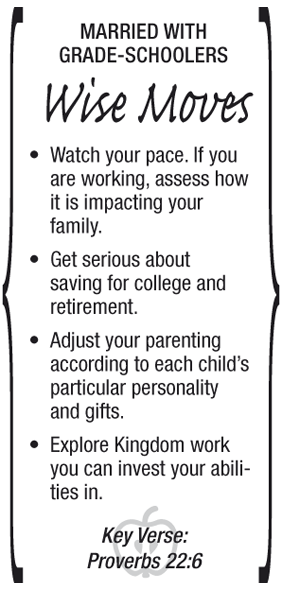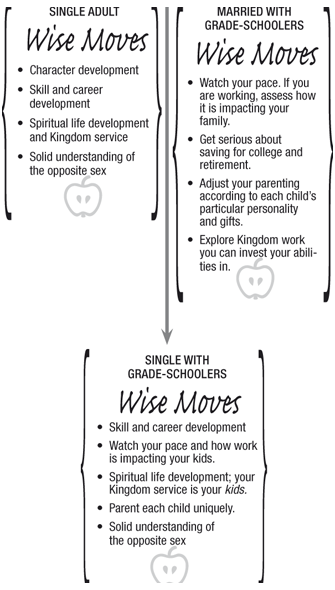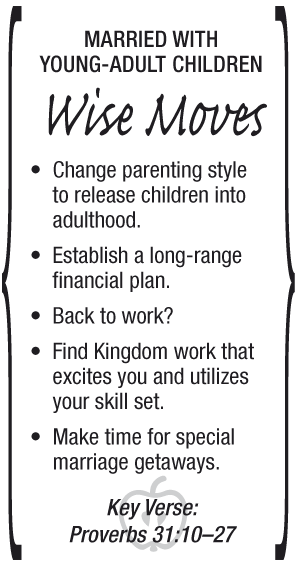The New Eve (15 page)
Authors: Robert Lewis

During this season many moms who are working begin to feel, as never before, that they're missing special moments in their children's lives. There's simply not enough time. Other mothers begin to entertain the idea of going back to work as their children grow older. But how much work? The truth is, a career mixes hard with the needs of a husband and school-age kids. There are no easy answers or formulas. Therefore, it is important in this season constantly to assess the work-home balance. Am I being a helper to my husband? Does he feel my support? My love? Are my children getting the love and attention they need from me? Will they feel I was there for them?
Perhaps the best and easiest way to get answers to these questions is to ask your family directly. If you do this in a sincere and humble way, you'll probably get honest feedback. From their input you can then choose to adjust or stay the course.
Financially, both income and expenses will probably keep rising in this season. You'll find it's extremely easy to spend more money than you make and nearly impossible to save too much. It was at this time that Sherard and I decided to impose the 10-10-80 rule. That is, save 10 percent, give away 10 percent, and spend the rest (avoiding major debt). If that sounds like a simple financial plan, it was. But at times it was also agonizingly hard to implement. We watched friends buy and do things that were within the reach of our credit cards. But we resisted using them. We drove preowned cars until there was no life left in them. Many of the upgrades on our home, we did ourselves. It wasn't that we lived as Spartans. Far from it. We enjoyed life. But it was a financially disciplined life.
We began to see the real fruit of our 10-10-80 rule after about seventeen years. That's right—seventeen years! One day I looked at my financial-investment account and saw that I had already put enough money away to send three of my four children to college. I even had a small retirement account too. All because at age twenty-seven Sherard and I made some firm financial choices that were hard at the time. (You might want to start even earlier.) Yes, we missed out on a few things, but over time we gained a whole lot more.

How are you and your husband dealing with your finances
in this season of life? If you're wise, you will get serious
now
about saving for college and retirement.
Finally, as your children move through their school years, their unique personalities and talents should become more and more apparent. I cannot stress enough how important it is for you as a parent to both recognize and honor who your child is and what gifts and abilities he or she possesses. Don't overlook or play down talents that seem odd or undesirable to you. Play up your child's gifts! And don't try to make children what they're not. Don't try and make a musician an athlete or push your easygoing kid to be an aggressive goal setter. Let them be themselves, whatever course that takes. Make them feel special because of their gifts.
Proverbs 22:6 says, “Train up a child in the way he should go.” A more literal translation would be, “Train up a child according to his bent.” It is every parent's job to know and honor this bent. It is also your job to encourage that bent to grow and flourish. In that regard, basic personality and gift testing is crucial for you to have an objective appraisal of your child. The earlier, the better. This becomes very helpful in knowing how to influence your child's life as he or she moves through school, especially through junior high and high school.
This concludes our discussion on the first half of your seasons as a woman. The next chapter will address the other half as well as some exceptions. But as we finish here, don't lose sight of why I am giving you this big-picture perspective of life. It's to help you see “there is a time for every event under heaven” (Eccles. 3:1).
The Seasons of a Woman's Life
(Part 2)
S
ome of you may be quick to comment that you don't really fit these general seasons of life I'm describing. For you, life is different because of circumstances you could not control or difficulties you helped create. My good friend Sandy Bone is one who knows that the expected seasons of life can sometimes get off track. Early in her fifties Sandy had her life turned upside down. After twenty-six years of marriage and raising two children, Sandy's husband was tragically killed in an automobile accident. Suddenly, the flow of life Sandy had long experienced made a hard U-turn into an unexpected new life: single again. Thrown into this strange new season, Sandy needed a game plan. The path that once seemed straight and simple was now crowded with new forks and bends.
Tragedy can do that. It can rip you from your comfort zone and set you down hard in a place where you're not sure what to do next. Divorce can do this too. So can infertility, remaining
unmarried, or marrying a man who already has kids. In these and other cases, the more typical and sequential seasons of a woman's life get scrambled, rearranged, or even repeated. So what do you do? How do you find your footing and make wise moves when the scenery of your life takes on an out-of-the-ordinary color?
You can start the process of discovering your new ground rules by blending two of the common seasons of life into a new, hybrid category that best describes your situation. Here's what I mean. First, select from the ten seasons I listed for you in chapter 7 the two that best describe your life now. For instance, if you have three grade-school children but are recently divorced, then the two seasons that best align themselves with where you are now would be “Single” and “Married with Grade-Schoolers.”
Next, select from these two seasons the wise moves in each that best apply to your particular situation. By combining these moves, you will find wisdom and direction for your new, hybrid season: “Single with Grade-Schoolers.” In such a case your wise moves for this blended season might look something like what is on the following page.
You can do this with any exception to the ten standard seasons. Did you marry a man with young-adult children? Then you are “Newly Married with Young-Adult Children.” Are you a young mom who just got engaged? Then you are “Single and Engaged with Preschoolers.” Are you married, childless, and middle-aged? Then you are “Married without Children,” but you have common ground with an “Empty Nester.” The point is, by blending any two of the more common seasons of life, you can create a wise course for your life.

This is what Sandy had to do. The tragic car accident converted her from a “Married Empty Nester” to a “Single Empty
Nester.” Like most singles, she needed a job. But which? Sandy had a college degree in teaching, but she had never used those skills except for a brief time when she led the women's ministry at our church. The idea of having to support herself was terrifying. Initially she opened her home to international students to help offset the rent and utilities. She also worked at Dillards for $8.50 an hour. As humbling as this was, Sandy knew it was God's way of stretching her character in new and unexpected ways. “This is what I had to keep telling myself,” she says with a smile. In this kind of situation, a woman must choose between faith and despair. Sandy chose faith.
Through it all her Christian friends were a great source of encouragement. “I couldn't have made it without them. They were incredible.” Her adult children offered their support too, but they could go only so far. They needed their space and the opportunity to live their own lives. Just because Sandy was single again did not mean she could use her situation to bond with them like before. Sandy understood this, but it also meant she felt really alone.
After a year of merely making ends meet, Sandy knew it was time to do something more meaningful with her life. As we discussed earlier, singles need to focus on ability and career development, while empty nesters need new work after kids in which to invest their lives. Being both single and an empty nester, Sandy began to investigate where her skills and interests could best be used. One thing kept surfacing: she liked to help people who were hurting. This realization led her to take “the wildest, riskiest leap of my life.”
She enrolled in graduate school to become a professional counselor. “I was older than all my professors and even the dean of the college. I had to work really, really hard. I cried more in my statistics classes than at any other time in my life. But it became
more and more evident that God was with me, sustaining me, empowering me. It was amazing what He did for me.” We who watched were also amazed—amazed at God and this wonderful woman He was blessing.
At age fifty-eight, after three and one-half years of graduate studies and another three and one-half years of residency work, Sandy took her national boards and became a licensed counselor. Her life and faith heroics set an example for all of us who watched her during those years. And God rewarded her for it too, not only with a good job but also with a new husband! I had the privilege of marrying Gayle and Sandy, and it was probably the most gratifying wedding I have ever performed. Before me was a real New Eve whose bold, courageous faith God had rewarded with a better life. I recently asked Sandy, now sixty-five, how things were going. “I'm at the happiest, most exciting time of my life,” she replied. I wasn't a bit surprised.
Of course, it's one thing for life circumstances to scramble your seasons. It's another thing for you to do it to yourself by engaging in a reckless live-in relationship or ignoring God's callings in favor of career ambitions and material things. These choices fly in the face of the natural flow of a woman's life, and all come with a high price tag attached. As the old saying goes, “You can't fool Mother Nature.” When you try, you're the one who gets fooled. It's so much better to go with the seasonal currents of life and maximize their opportunities than it is to fight against that flow and pay heavy penalties. The more you can see and appreciate this bigger picture of life, the better you'll be able to see your way to the good life. Now let's finish outlining the final five seasons of a woman's life.
You've taken your kids through “Ready” and “Set,” now it's time for
“Go!”
Like it or not, your older teenage children
increasingly need their own space. As emerging adults, they are in the serious business of defining their own lives, and they must do this more and more without you. This means you must transition from your role as chief caregiver, guardian, and standard bearer to one that more resembles that of a friend and occasional consultant. This is difficult for most moms. It's natural to want to maintain a close, protective orbit around your kids' lives, but doing so will do more harm than good. You'll exhaust everyone if you try to preserve unmodified that original bond you had with your kids. Yes, they need a mother for life, but what they don't need is
mothering
for life. That can actually harm your kids—especially sons.
When a mom refuses to let go of her son but instead over-nurtures and overmothers him, one of two bad things may happen. First, she may inadvertently train her son to fear closeness with a woman. That's because closeness to Mom brought with it her control and smothering love. Therefore, for his masculinity and sense of autonomy to survive, the son must constantly push his mother away and rebel against her excessive involvement. But in doing so, he also learns at this impressionable age to fear
all
feminine love as a threat to self. Later as adults, men like this can successfully relate only to women they can dominate. No giving
in. No compromise. No getting too close. No talking back. Just do as I say. This is how such men feel safe with women. It's a survivalist tactic they learned at home in their relationship with Mom.

